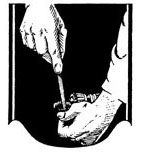
Is Human Life “Sacred”? A Taidan with Kevin Doak
CULTURAL COUNTERPOINT
When the U.S. Supreme Court decided Roe v. Wade and Doe v. Bolton as victories for the sexual revolution in 1973, abortion was still treated — even by the most vocal advocates of women’s liberation — as a regrettable but at times necessary procedure. Until just a few years ago, the rhetoric around abortion from its mainstream apologists was that it should be “safe, legal, and rare.”
In recent years, however, assaults on the human person have become increasingly brazen, and abortion rhetoric has followed suit. “Abortion on demand and without apology” has replaced “safe, legal, and rare.” Some women — for example, HBO star Lena Dunham — have even apologized for not having had an abortion yet. David Daleiden’s undercover videos of “medical researchers” haggling over the prices of fetal body parts and driving hard bargains — one former Planned Parenthood medical director wanted to “bump up” prices because, she said, “I want a Lamborghini” — provided a glimpse into the business of abortion, revealing how contemptuous many in our culture are toward human life.
In the gathering darkness, many pro-lifers have attempted to push back. Some have reached out to death-penalty opponents, anti-animal-cruelty organizations, or immigrant-protection organizations to try to strengthen their position. A common phrasing has emerged from these ecumenical encounters: that human life is sacred, or even that all life is sacred, period.
But what does the Catholic Church teach about life? Is all life, or all human life, really sacred? Georgetown University professor Kevin Doak, an expert on Japanese history and culture and, in particular, Catholic history and thought in Japan, and I recently engaged in a taidan (conversation) about this topic.
You May Also Enjoy
If we want our dignity — and our freedom of speech — back, then we have only to stop giving it away to the Internet.
The unborn exist in a borderland between the shedding of innocent blood and the sacrificing of children so that individual sovereignty remains intact.
Why have no studies been done to investigate the long-term effects of vaccines? Why aren't pharmaceutical companies more closely monitored for their testing procedures?

